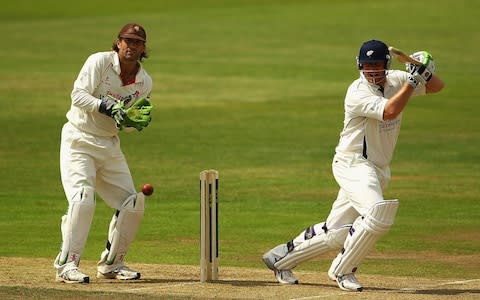Luke Sutton exclusive interview: 'A warning to players and clubs - professional sport is a breeding ground for addiction'

Luke Sutton is supposed to be driving his diabetic daughter to a hospital appointment. Instead, he is slumped on his kitchen floor drunk.
It is 8.45am and he is drinking red wine because it is strong and the bottle is dark green so he can take it off the rack, unscrew the top, have a couple of glasses and nobody would be any the wiser.
Sutton has been drinking solidly for 10 days, a binge that had started with celebrations for his 35th birthday, included being blind drunk at Euston station, where he bumped into some of his old Lancashire team-mates, and culminated in that missed hospital appointment.
It was his lowest moment, but also the one that changed his life.
Sutton played county cricket for 15 years as a wicketkeeper-batsman for Lancashire and Derbyshire, before retiring in 2011 to become a successful agent to cricketers such as James Anderson, Matt Prior and James Taylor as well as footballer Simon Mignolet, the gymnast Louis Smith and boxer Carl Froch.
Only those closest to him have had any idea that behind the successful sportsman and businessman is the story of a bitter battle with mental health problems, alcohol addiction and bereavement.

Sutton, now 43, has just published a book entitled Back from the Edge. It is a raw account of his alcoholism and the process of rebuilding his life. It centres on his 28-day stay in the Priory, and there cannot be many more brutally honest or revealing accounts of what goes on behind the walls of an addiction centre written by a patient trying to rebuild his life.
The book is short, running to just over 100 pages, and there is barely a mention of his cricket career or the game as a whole. Instead it is a manual about recovering from alcohol addiction and a warning to governing bodies and player associations about the pitfalls of ignoring the danger signs in young sportspeople.
“The last 10-day period before I went into the Priory was horrific," he tells Telegraph Sport. "That period of time when I was at Euston station and I was completely helpless. I was desperate for help but I did not know what with. I just knew that something was quite seriously wrong. Turning up to the house and not being able to take the kids to hospital because of the state I was in, that was a really really dark moment.
“What I would say is that during those 10 days I was under the influence of alcohol so the emotions were subdued a bit. The hardest moment was sat in the Priory on day one or two and the realisation of what was happening to me. This was not part of my life’s plan. How did I end up here? How do I make sense of it? I felt absolutely desperate and alone. At that point I was completely sober so the feelings were very real. This was it. It was total breakdown.”

Sutton writes movingly about his group therapy sessions and of the troubles of 'Jonathan', a fellow patient whose name has been changed by Sutton in the book. He was a successful businessman who died just weeks after Sutton last saw him, alone in a London hotel from alcohol poisoning.
Sutton had spent years fighting alcohol problems. He would go drinking in the bars of Kings Cross, Sydney at 8.30am when he was playing grade cricket in Australia as a young player. He was once rushed to hospital with an attack of pancreatitis after a heavy bender while playing for Derbyshire and was told by the doctors to never drink again (he ignored them). On a pre-season tour to Portugal he blacked out in the resort car park for four hours after a heavy night.
But he would also train hard, pushing his body to the limit as a “punishment and reward’ mentality took over.
The most moving section of the book is about the death of his girlfriend, Nia Walters, in a car crash aged just 26. Sutton describes sitting in their flat waiting for her to come home. He had bought an engagement ring and planned to propose in a few week’s time on their holiday to Mexico. He called her mobile several times without success. “It was strange but I felt sure all was good.” Then her parents came over to tell him the devastating news.
“It was like a bomb arriving in my life. I just was not capable of dealing with it. I could not process it or bear the attention I got because I did not know how to behave or how I was meant to react,” he says. “I felt like all the trust I had in life just went. I lost the compass of how to live. I thought it was why I drank, but although it accelerated things, it was not the big reason why I was behaving like that.

“The peak point came was when I finished playing. At times I thought this way of living where I would work hard and party hard worked for me. It just became a slowly self destructive way to live my life that reached its crescendo when I totally broke down.”
Sutton was booked into the Priory by Kelly Chapple, wife of his Lancashire team-mate, Glenn. They saved his life. He had spent years worrying about how he was viewed by others, and was worn down by putting on a show, desperate for outside affirmation. It was only when 'Richard', his therapist, taught him to change how he viewed himself that he started to get better.
Eight years on and Sutton has not had a drop of alcohol. “It is not for me," he says. "It does not make me happy or live a good life. I went through a period, which I have not put in the book, that for three years after I left the Priory, I went back and volunteered. That massively helped me in those early years when I was trying to get used to life with such change.
“People like 'Richard' and the therapists at the Priory are extraordinary. They are compassionate, patient and some of the most special people I have met in my life. I owe everything to them.”
Sutton often thinks back to 'Jonathan', the patient the Priory could not save. “He had been in the Priory a number of times. It was not his first shot at it. It is not lost on me that on my last day in the Priory when I spoke to him and he was dead six to eight weeks later. At the time I had never seen anyone look so poorly physically yet still be alive. It was shocking, yet he was still battling with controlling alcohol. The insanity of it was terrifying. It was a tragic thing that happened to him and his family and it lives with me all the time because I could have ended up the same way.”
The book ends with a plea. More needs to be done to save other sportspeople ending up the same way.
“My book is definitely a warning to players, clubs and governing bodies. Professional sport is a breeding ground for addiction because the type of person who excels in it and the demands of it are the same attributes that might lead to something. They are going to struggle to find balance.
"Things that make them brilliant are going to be their weaknesses. At the moment we try and bury our heads in the sand if someone is playing brilliantly. We do not want to flag it up. Then they retire, are in the outside world and we see their world deteriorate. Then we say: 'Wow! Did you see what happened to Robin Smith or Paul Gascoigne?' It will keep happening.”
Back from the Edge by Luke Sutton is published by White Owl Books. RRP £12.99

 Yahoo Sport
Yahoo Sport 





































